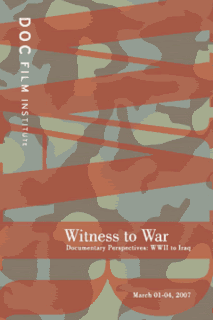Witness to War
This weekend I attended the Witness to War Documentary Perspectives: World War 2 to Iraq event presented by the DOC Film Institute and International Center for the Arts.

It was a four-day event with screenings of award winning documentaries and renowned filmmakers, critics, and writers. Unfortunately, I was unable to attend the highly anticipated compilation from the new seven-part documentary series introduced by Ken Burns, himself at the Castro Theatre. The second evening of the event featured part one of THE WAR, his newest documentary about the Second World War. The series is scheduled to air in September on PBS.
Although I didn't attend the first two nights, I did attend the FREE screenings of the other war documentaries held at the de Young Museum. On Saturday I watched the tribute to Humphrey Jennings a highly regarded British filmmaker. His films Listen to Britain, and A Diary for Timothy were both short documentaries filmed during the Second World War. I actually kinda dozed off during both films, but I got the idea of the films. Listen to Britain didn't have dialogue, the musical soundtrack, and radio edited into the film are the narrative of the film. It is filled with strong images of British soldiers, training, and preparing for battle. A Diary for Timothy, was more interesting because its narrative takes the form of a father keeping a diary for his son, during the last days of the war. As the narrator is describing the events of the last six months of the war, which happen to be the first six months of the Timothy's life, he includes satirical comments about life after war. The letter is somewhat of a warning to Timothy and viewers that perhaps the most fearful things are yet to come after the war.
The third film I watched, Iraq in Fragments was also the closing film for the event. It is James Longley's 2006 Sundance Film Festival documentary winner for Best Director, Best Cinematography, and Best Editing. It also won the 2006 Full Frame Documentary Film Festival-Grand Jury Prize, but lost the Academy Award to Al Gore's An Inconvenient Truth. Mark Danner, an American journalist, who specializes in U.S. foreign affairs, gave a great introduction to the film. He gave high praises to the films ability to show the daily lives of Iraqis during the war. Danner mentioned that he has never viewed a film that eloquently portrayed the lives of civilians in a war zone. The film as indicated by the title is in three fragments. The first follows an 11-year-old boy who works for an auto-mechanic in Baghdad. We witness the boy struggle to learn to read and write, as well as maintain the part-time job that helps his family survive. The second part of the film is more political as follows it, Sadr's followers in opposition of the American Occupation. The group want to rule Iraq according to very strict Islamic customs. There is an intense scene in which men are kidnap and beaten because Sadr's followers believed they were selling alcohol at the market. The final part of the film takes place in the rural part of Iraq where the Kurds own farmlands. Longley films the election for the province's councilman.
I feel that this is a powerful documentary because it gives an in depth first hand account of the lives of Iraqis not shown on the news. The characters that Longley follows represent the three different groups of people currently living in Iraq, the Shia, Sunni, and Kurds. One of the most surprising things I learned was that the conflict among the people was created and fueled by the Saddam and continues to be by the American government. I liked that Longley did not use a narrator but let the characters in his story talk. I also thought it was creative and fresh that he didn't film (or at least edit in) any interviews of the subjects into the documentary.
It's exciting to hear that the DOC Film Institute is a part of San Francisco States and hope that I will be able to take part again in another of there events.

3 Comments:
I don't think I could stomach watching a war documentary. I've probably seen some in class, but really can't tell you the name. The closest thing I can related to is watching Saving Private Ryan. , which I heard was a very good portrayal of what actually happens in a real war. What draws you to watching these types of documentaries?
How realistic did you think that movie was, if you have seen it?
I wish I knew Ken Burns was going to be here. He's made lots of good docs. The Longley documentary looks great. Filming it from three different perspectives must really help clarify why there is so much strife between the Kurds, Shiite, and Sunnis. They each want to run the country their own way, and I'm sure they all want the War to end.
If you're interested here is an in-depth interview with Longley about his movie. I skimmed through it and it has tons of good info.
Documentary work is such a beautiful and meaningful art. I am considering to make it my career focus. It's too bad that school work got in my way of seeing the film yet but I plan on it. Thanks for the inspiring review.
I am just sick at our goverments lies and ties with Saddam. Here's a nifty little Bush family tree of coruption and profitting of death.
Post a Comment
Subscribe to Post Comments [Atom]
<< Home